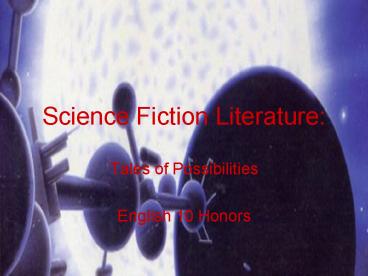Science Fiction Literature: - PowerPoint PPT Presentation
1 / 16
Title:
Science Fiction Literature:
Description:
Science Fiction Literature: Tales of Possibilities English 10 Honors Definition Science fiction is a literary or cinematic genre that focuses on imaginative ... – PowerPoint PPT presentation
Number of Views:127
Avg rating:3.0/5.0
Title: Science Fiction Literature:
1
Science Fiction Literature
- Tales of Possibilities
- English 10 Honors
2
Definition
- Science fiction is a literary or cinematic genre
that focuses on imaginative scientific
discoveries or developments, consequences of
environmental or societal changes, space travel,
or finding life on other planets. - Every author seems to have his / her own
definition of this elusive term.
3
Mary ShelleyThe Real Dr. Frankenstein?
- Mary Shelly published Frankenstein in 1818.
- She had written the novel in a competition with
her friends to create the most horrific ghost
story. - Frankenstein had a great impact on the literature
of the world.
4
H. G. Wells
- Known as the father of the science romance novel,
Wells always incorporated social themes in his
works. - He was one of the first writers to postulate time
travel, invisibility potions, alien invasions,
and genetic manipulation.
5
Jules Verne
- Verne was much more interested in scientific
accuracy. As a result, he predicted the invention
of elevators, atomic submarines, and rocketships.
6
Other Nineteenth-Century Writers
- Edgar Allan Poe dabbled in science fiction with
many of his short stories and his one, incomplete
novel The Narrative of Gordon Pym.
- Nathaniel Hawthorne described genetic experiments
and the quest for immortality in Rappaccini's
Daughter and Dr. Heideggers Experiment,
respectively.
7
The Pulp Novels
- Many science fiction writers began their careers
contributing stories to various pulp magazines. - During the early twentieth century, there were
many such magazines in publication.
http//www.weird-tales.com/history.htm l
8
Edgar Rice Burroughs
- Most famous for creating the character Tarzan,
Burroughs had a penchant for creating strange,
lost worlds on earth as well as other planets.
9
H. P. Lovecraft
- Lovecraft postulated the existence of gigantic,
malevolent beings who once ruled the earth (and
who intend to rule it once again once disposing
of mankind).
10
Isaac Asimov
- Perhaps one of the most eclectic writers of the
twentieth century, Asimov has published works on
practically every subject. - His most famous works include the Foundation and
The Caves of Steel series. - Asimov created the Three Laws of Robotics 1) to
serve mankind, 2) never to harm mankind, and 3)
never to disobey mankind unless it would result
in the breaking of either Rule 1 or 2.
11
Robert A. Heinlein
- Robert A. Heinleins most famous works include
Starship Troopers. - In A Stranger in a Strange Land, Heinlein
introduced the world to the popular word grok,
meaning complete understanding.
12
Frank Herbert
- Frank Herberts Dune is considered a classic work
of literature, in general. - Several sequels were written to make Herberts
imaginary world one of the most extraordinary
conceptions to be found in science fiction.
13
Arthur C. Clarke
- Clarke is probably most famous for writing the
screenplay for 2001 A Space Odyssey for Stanley
Kubrick he wrote the novel afterwards. - Rendezvous with Rama deals with the exploration
of a mysterious alien vessel that has entered our
solar system. - Like Verne before him, Clarke conceived of
scientific achievements in his fiction that
became reality, namely communication satellites
that are in geostationary orbit.
14
Ray Bradbury
- Like Asimov, Bradbury is a very eclectic author.
- In The Martian Chronicles, he describes mans
attempt to establish colonies on other problems. - Fahrenheit 451 imagines a future in which all
forms of writing are forbidden.
15
Orson Scott Card
- Card is most famous for Enders Game and its
first sequel, Speaker for the Dead. - In 1986 and 1987, he won both the Nebula and Hugo
Awards for both works. He is the first author to
win such recognition in two consecutive years. - Xenocide and Children of the Mind also belong in
the series.
16
Legacy of These Authors
- The works of these writers have inspired the
creation of many television shows and movies.



























![❤[READ]❤ Common Sense (Dover Thrift Editions) (Dover Thrift Editions: Political Science) PowerPoint PPT Presentation](https://s3.amazonaws.com/images.powershow.com/10043931.th0.jpg?_=20240531068)



